Commonwealth’s 60th anniversary summit .. still “an old boys club headed by an old lady”?
Nov 30th, 2009 | By Randall White | Category: Countries of the World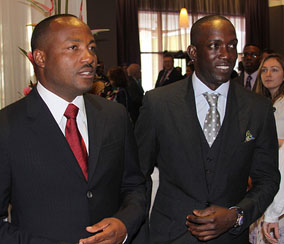
Cricket legend Brian Lara and former Manchester United star Dwight Yorke – both Trinidad and Tobago nationals – arrive for a Commonwealth summit event hosted by Queen Elizabeth II in Port of Spain, Trinidad and Tobago, November 28, 2009. Kenroy Ambris/Commonwealth Secretariat.
[UPDATED DECEMBER 2, 2009]. How many sovereign people of Canada today are even aware that there was a 60th anniversary summit of the Commonwealth of Nations this past weekend in Trinidad and Tobago?
A poll commissioned by something called the Royal Commonwealth Society this past summer asked a representative sample of Canadians: “Which one of the following is the MOST important to Canada?” Almost two-thirds (63%) said “America.” Only 15% said “The Commonwealth.” (Another 8% said “Europe,” and 14% said “Don’t know.”)
The Commonwealth, of course (for those who may have forgotten), is what the former British empire – “greatest empire since Rome” on which “the sun never dared to set”, etc, etc – began to collapse into in 1949. At that point India, the old Jewel in the Crown, became an independent republic, putting an end to the earlier doctrine of global British subjects united by common allegiance to a single Monarch/Empress [Emperor] of India/Dominions Beyond the Seas/by the Grace of God, etc, etc.
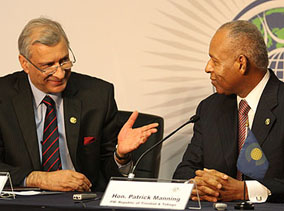
Commonwealth Secretary-General Kamalesh Sharma (left) with Trinidad and Tobago's Prime Minister, Patrick Manning, at the pre-summit press conference on 26 November 2009. Kenroy Ambris/Commonwealth Secretariat.
This past summer’s survey also suggested that there is a big question mark beside the Commonwealth’s current future, especially among the likes of Canadians, Australians, and the remaining British subjects in the United Kingdom.
To help enhance the relevance of the proceedings, the host Prime Minister of Trinidad and Tobago Patrick Manning and his colleagues arranged to have the 60th anniversary summit focus on the crucial issue of climate change – as a kind of warm-up to the broader international climate change colloquium in Copenhagen, Denmark, this coming December 7—18.
The main accomplishment here was a 14-point Commonwealth text in favour of actually doing something more or less serious about climate change, signed by all 52 countries attending the summit, to help build momentum for “Copenhagen and Beyond.”
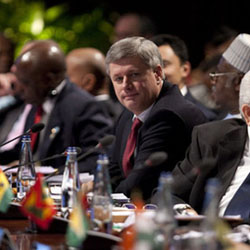
Prime Minister Stephen Harper takes part in a special session on climate change at the Commonwealth summit in Trinidad and Tobago on Nov. 27, 2009. Sean Kilpatrick/The Canadian Press.
According to The Age in Australia, the Commonwealth is united behind the cause here. And this is “significant because India’s Prime Minister Manhohan Singh and Canadian Prime Minister Stephen Harper were part of the consensus” – even though “Mr Harper has yet to announce his country’s proposed greenhouse gas cuts, and has also at times been a critic of the Copenhagen process.”
Another issue that was apparently discussed “in the margins” of the more serious work this past weekend involved British Prime Minister Gordon Brown’s plans to remove the current Church of England religious requirement from the qualifications for British monarchs – which dates from the early 18th century.
This may have been partly inspired by a Canadian Charter of Rights challenge brought by the former Toronto city councillor Tony O’Donahue (even though the challenge itself failed). Change of this sort would have to be approved not just by the government of the United Kingdom, but also by the 15 other Commonwealth countries – or so-called “Commonwealth Realms” – who currently still share the British monarch as alleged official head of state (including Canada, Australia, Jamaica, Barbados, and so forth).
As a sign of other institutional change, the predominantly French-speaking African nation of Rwanda joined the Commonwealth this past weekend as well – becoming the second member country that is not a former British colony. (This gives the Commonwealth 54 current member countries, although two did not send delegates to Trinidad and Tobago – “Fiji, which has been suspended due to a coup, and Nauru, which has been suspended due to fee arrears.”)
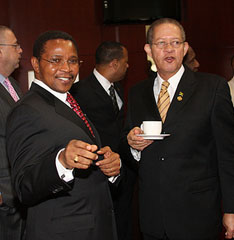
Jamaica Prime Minister Bruce Golding (r) and Tanzanian President Jakaya Kikwete. Kenroy Ambris/Commonwealth Secretariat.
As another departure from earlier strictly Commonwealth of Nations gatherings, in connection with the broader climate change discussions, the meeting this past weekend was attended by United Nations Secretary-General Ban Ki-Moon, French President Nicholas Sarkozy, and Danish Prime Minister Lars Rasmussen.
In keeping with earlier tradition, on the other hand, Queen Elizabeth II attended with her customary dignity. Though now formal head of state for only 16 of the current 54 member countries, she is still a symbolic Head of the Commonwealth.
Whether Her Majesty’s son and/or grandson will inherit this role remains an open question – as does the future of the Commonwealth itself, of course (to say nothing of the British monarchy itself).
The journalist Raffique Shah, from Trinidad and Tobago, has been notably sceptical, about both the benefits of holding Commonwealth summits for the host country, and the ultimate destiny of this now rather peculiar international organization. The Commonwealth today, Mr. Shah believes, is “nothing more than an ’old boys club’ headed by an old lady … It is passé, an anomaly in a modern world where alliances have changed, where geopolitics dictate who are your new friends …”
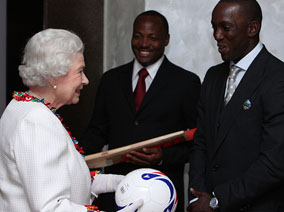
Queen happily receives autographed cricket bat from Brian Lara and autographed football from Dwight Yorke. Commonwealth Secretariat.
That may be. But, whatever else, the Commonwealth today is quite a different institution from what it was 60 years ago.
As Mr. Shah himself has urged, in the early 21st century “India is probably the strongest pillar on which the Commonwealth is built. Have you noted how many Indians occupy the highest positions in its Secretariat and its many off-shoot institutions?” (Or, as a Chinese report has put it: “The organization represents around 2 billion people, although more than a billion are in just one member, India.”)
It may still be an old boys club at heart. But the old boys at least look quite a bit different than they used to. And the way things go nowadays that may count as progress, of a sort.
* * * *
UPDATE: On “British Prime Minister Gordon Brown’s plans to remove the current Church of England religious requirement from the qualifications for British monarchs,” the December 1 issue of the New Zealand Herald has reported: “Prime Minister John Key says New Zealand will give its support to change royal succession law that …bans Catholics from marrying into the royal family … British Prime Minister Gordon Brown …Â said he would raise the issue at the Commonwealth Heads of Government Meeting …Â that has just finished … but he did not raise it with either Mr Key or Australian Prime Minister Kevin Rudd, among the 15 other countries he must consult … Mr Key said the meeting’s focus on climate change might have delayed the consultation … But he said New Zealand supported the move and he said he was questioned by British media on it.”
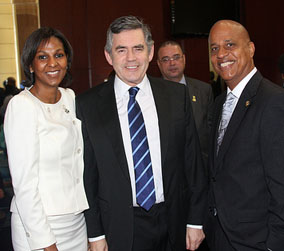
Belize Prime Minister Dean Barrow (r) and his wife Kim with British Prime Minister Gordon Brown. Kenroy Ambris/Commonwealth Secretariat.
The cutest secretary at the counterweights headquarters – impressed that republics which do not recognize Queen Elizabeth II as titular head of state can still be members of the Commonwealth in the early 21st century – has also suggested that it might be interesting to append a list of current Commonwealth member countries to this article, with what the CIA World Factbook calls their “government type” duly noted. I have tried to oblige below.
I would like to thank the Royal Commonwealth Society as well for its informative comment still further below. Those concerned about the future of the Commonwealth should no doubt join in on the Society’s largest ever global public consultation. [RW].
The following list of all 54 current Commonwealth members (including the currently suspended Fiji and Nauru) is ranked from most to least populous (based on 2007 data). It includes the name of the country, the government type, the broad geographic region, and the 2007 population. Government type is divided into four classes: “Parliamentary Republic” – broadly modelled on the United Kingdom (without a monarchy) or India; “Presidential Republic” – broadly modelled on the United States (or at least the current Fifth French Republic); “Realm” or a country that still recognizes the British monarch (i.e. Queen Elizabeth II) as titular head of state; and “Monarchy” or a country that recognizes some other hereditary monarch as head of state (as in the case of King or Sultan Mizan Zainal Abidin in Malaysia, or the Sultan of Brunei, Sir Hassanal Bolkiah). This classification is somewhat rough and ready, at the very least, but it seems rigorous enough for the purposes at hand:
India, Parliamentary Republic, South Asia, 1,169,016,000
Pakistan, Parliamentary Republic, South Asia, 163,902,000
Bangladesh, Parliamentary Republic, South Asia, 158,665,000
Nigeria, Parliamentary Republic, West Africa, 148,093,000
United Kingdom, Realm, Northern Europe, 60,769,000
South Africa, Parliamentary Republic, South Africa, 48,577,000
United Republic of Tanzania, Presidential Republic, East Africa, 40,454,000
Kenya, Presidential Republic, East Africa, 37,538,000
Canada, Realm, North America, 32,876,000
Uganda, Parliamentary Republic, East Africa, 30,844,000
Malaysia, Monarchy, Southeast Asia, 26,572,000
Ghana, Presidential Republic, West Africa, 23,478,000
Mozambique, Presidential Republic, East Africa, 21,397,000
Australia, Realm, Oceania/Pacific, 20,743,000
Sri Lanka, Parliamentary Republic, South Asia, 19,299,000
Cameroon, Presidential Republic, West Africa, 18,549,000
Malawi, Presidential Republic, East Africa, 13,925,000
Zambia, Presidential Republic, East Africa, 11,922,000
Rwanda, Presidential Republic, East Africa, 10,473,000
Papua New Guinea, Realm, Oceania/Pacific   6,331,000
Sierra Leone, Presidential Republic, West Africa, 5,866,000
Singapore, Parliamentary Republic, Southeast Asia, 4,436,000
New Zealand, Realm, Oceania/Pacific, 4,179,000
Jamaica, Realm, Caribbean, 2,714,000
Namibia, Presidential Republic, Southwest Africa, 2,074,000
Lesotho, Monarchy, South Africa, 2,008,000
Botswana, Presidential Republic, South Africa, 1,882,000
The Gambia, Presidential Republic, West Africa, 1,709,000
Trinidad & Tobago, Parliamentary Republic, Caribbean, 1,333,000
Mauritius, Parliamentary Republic, Indian Ocean, 1,262,000
Swaziland, Monarchy, South Africa, 1,141,000
Cyprus, Presidential Republic, Mediterranean Sea, 855,000
Fiji Islands, Parliamentary Republic, Oceania/Pacific, 839,000 (Fiji is currently suspended due to a coup.)
Guyana, Parliamentary Republic, South America, 738,000
Solomon Islands, Realm, Oceania/Pacific, 496,000
Malta, Parliamentary Republic, Mediterranean Sea,   407,000
Brunei Darussalam, Monarchy, Southeast Asia, 390,000
Maldives, Presidential Republic, Indian Ocean, 337,000
The Bahamas, Realm, Caribbean, 331,000
Barbados, Realm, Caribbean, 294,000
Belize, Realm, Central America, 288,000
Vanuatu, Parliamentary Republic, Oceania/Pacific, 226,000
Samoa, Parliamentary Republic, Oceania/Pacific, 187,000
St. Lucia, Realm, Caribbean, 165,000
St. Vincent & the Grenadines, Realm, Caribbean, 118,000
Grenada, Realm, Caribbean, 106,000
Tonga, Monarchy, Oceania/Pacific, 100,000
Kiribati, Presidential Republic, Oceania/Pacific, 99,000
Seychelles, Presidential Republic, Indian Ocean, 87,000
Dominica, Parliamentary Republic, Caribbean, 79,000
Antigua and Barbuda, Realm, Caribbean, 77,000
St. Kitts and Nevis, Realm, Caribbean, 46,000
Nauru, Presidential Republic, Oceania/Pacific, 10,000 (Nauru is currently suspended due to fee arrears.)
Tuvalu, Realm, Oceania/Pacific, 10,000
SOURCES: Commonwealth Secretariat; Commonwealth members, The official website of The British Monarchy; Republics in the Commonwealth of Nations: From Wikipedia, the free encyclopedia; Commonwealth realm: From Wikipedia, the free encyclopedia; CIA World Factbook.


(Something called) The Royal Commonwealth Society, an independent international educational charity based in London, is undertaking the largest ever global public consultation on the future of the Commonwealth. Join in at http://www.commonwealthconversation.org
Commonwealth was a prominent opponent of the apartheid regime in South Africa. In the 1960s, Canadian Prime Minister John Diefenbaker and Indian Prime Minister Jawaharlal Nehru led a joint effort that read South Africa out of the Commonwealth. In the 1980s, Canadian Prime Minister Brian Mulroney rebuffed efforts by UK Prime Minister Margaret Thatcher and US President Ronald Reagan to dilute sanctions until South Africa really began to reform and democratize in a genuine and determined way. Â Commonwealth suspended Nigeria for 3 years after the 1995 hanging of the activist Ken Saro-Wiwa. Zimbabwe was suspended from Commonwealth in 2002.Â
The Commonwealth allows for member countries to be suspended for Human Rights abuses, but ignores the impact of greenhouse gas emissions on some of the poorest countries in the world. The definition of serious violations should embrace much more than it does now.
But present Canadian Prime Minister Stephen Harper’s foreign and domestic policy has fulfilled the hopes of US conservatives. In 2007 Canadin Prime Minister Stephen Harper along with Australian Prime Minister John Howard has successfully blocked more than 50 Commonwealth countries that were seeking a climate change resolution that would force industrialized countries to adopt a binding commitment to reduce greenhouse gas emissions. Canada’s lack of action on climate change is contributing to droughts, floods and sea level rises in small island states and vulnerable commonwealth countries such as Maldives, Bangladesh, and Mozambique. Canada’s emissions have risen by more than 25% between 1990 and 2007. Canada is at the bottom of the G8 for action to tackle climate change. Canadians consumes far more than their fair share of petroleum and owe a debt to developing countries of the Commonwealth for the impact of their emissions on the climate. Canada is getting away with climate crimes that are destroying homes and livelihoods of the people live in developing countries of the Commonwealth. Present Canadian government continues to support for the extraction of oil from Alberts tar sands, a process which is 3 times as damaging to the climate than extracting conventional oil. Extracting millions of barrels of dirty oil from Alberta tar sands and abandoning the Kyoto treaty is not the behaviour of a responsible commonwealth country and Canada should be suspended from Commonwealth immediately. Canada’s complete failure to cut its emissions is making the global situation worse. If the Commonwealth countries are serious about holding their members to account, then they should suspend Canada immediately since it is threatening the lives of millions of people in developing Commonwealth countries. Unless Canada is willing to stop blocking international climate negotiations through its continued support for the Alberta tar sands, Canada should withdraw its membership with Commonwealth. The Commonwealth should hold Canadian government to a higher standard.Â
– Nalliah Thayabharan